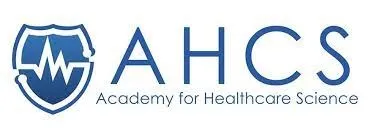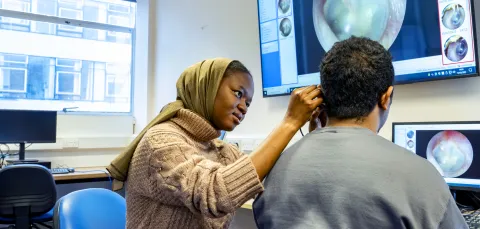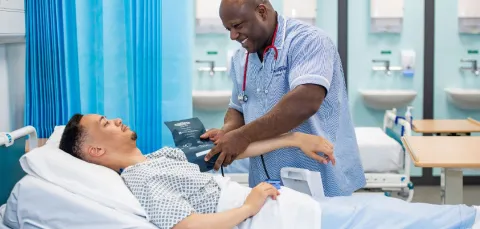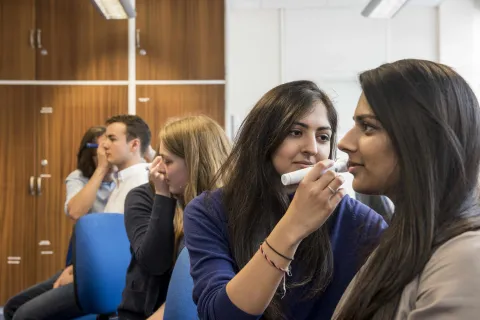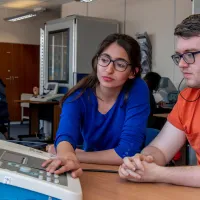About this course
You'll learn the clinical and professional skills you need to become an audiology healthcare professional. We are the only UK university with in-house audiology and auditory implant clinics.
Hearing loss, deafness, tinnitus and balance problems are major health issues and have an impact on quality of life. You’ll learn to manage these conditions and support patients while developing academic, professional and employability skills.
The audiology course teaches you about the biopsychosocial and technical foundations of audiology, as well as the broader scientific, technical, healthcare and professional skills you’ll need from university to become a audiologist.
Throughout this audiology degree, you’ll attend practical sessions in our dedicated skills laboratory and clinics. You’ll also go on a 27-week clinical placement to support your audiologist training.
You’ll also get to explore in depth an aspect of clinical practice that interests you.
When you complete your first year of BSc audiology, you can apply to register as a Hearing Care Assistant (HCA). This means you can take paid assistant audiology roles for the rest of your degree. It’s also possible to switch to part-time for year 3, so you can spread out your placement over a longer period.
This programme is recognised by the National School of Healthcare as a Practitioner Training Programme (PTP).
The course is also accredited by
- the British Society of Hearing Aid Audiologists, allowing you to work as a hearing care assistant after year 1.
We regularly review our courses to ensure and improve quality. This course may be revised as a result of this. Any revision will be balanced against the requirement that the student should receive the educational service expected. Find out why, when, and how we might make changes.
Our courses are regulated in England by the Office for Students (OfS).
What it's like to study Audiology at Southampton
International student from Nigeria, Rabiat Garba, talks about her experience studying BSc Audiology at the University of Southampton.
Learn more about these subject areas
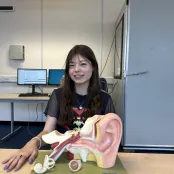
In audiology, no day is the same. You are continuously facing new challenges. We are reconnecting people with themselves, their families and friends and the world around them.
Course location
This course is based at Highfield.
Awarding body
This qualification is awarded by the University of Southampton.
Download the Course Description Document
The Course Description Document details your course overview, your course structure and how your course is taught and assessed.
Entry requirements
For Academic year 202627
A-levels
ABB including an accepted subject (minimum grade B)
A-levels additional information
The following are considered to be an acceptable science subject: Biology, Chemistry, Physics, Maths, Further Maths, Psychology, Statistics, Environmental Science, Environmental Studies, Geography and Geology.
Offers typically exclude General Studies and Critical Thinking.
A-levels with Extended Project Qualification
If you are taking an EPQ in addition to 3 A levels, you will receive the following offer in addition to the standard A level offer: BBB including an accepted subject, plus grade A in the EPQ
A-levels contextual offer
We are committed to ensuring that all learners with the potential to succeed, regardless of their background, are encouraged to apply to study with us. The additional information gained through contextual data allows us to recognise a learner’s potential to succeed in the context of their background and experience. Applicants who are highlighted in this way will be made an offer which is lower than the typical offer for that programme as follows:
BBC including an accepted subject (minimum grade B)
International Baccalaureate Diploma
Pass, with 32 points overall with 16 points required at Higher Level including a minimum of 5 at Higher Level in an accepted science subject.
International Baccalaureate Diploma additional information
Accepted science subjects include biology, chemistry, geography, environmental systems and societies, mathematics (Analysis and Approaches at grade 5 or Applications and Interpretation at grade 6), physics and psychology.
International Baccalaureate contextual offer
We are committed to ensuring that all learners with the potential to succeed, regardless of their background, are encouraged to apply to study with us. The additional information gained through contextual data allows us to recognise a learner’s potential to succeed in the context of their background and experience. Applicants who are highlighted in this way will be made an offer which is lower than the typical offer for that programme.
International Baccalaureate Career Programme (IBCP) statement
Offers will be made on the individual Diploma Course subject(s) and the career-related study qualification. The CP core will not form part of the offer. Where there is a subject pre-requisite(s), applicants will be required to study the subject(s) at Higher Level in the Diploma course subject and/or take a specified unit in the career-related study qualification. Applicants may also be asked to achieve a specific grade in those elements. Please see the University of Southampton International Baccalaureate Career-Related Programme (IBCP) Statement for further information. Applicants are advised to contact their Faculty Admissions Office for more information.
BTEC
RQF BTEC
DDM in the BTEC National Extended Diploma in Applied Science or Health and Social Care.
DD in the BTEC National Diploma (any subject) plus grade B in an accepted science at A-level.
D in the BTEC National Extended Certificate (any subject) plus grades AB in two A-levels including an accepted science subject.
Additional information
We accept the following BTEC National Extended Diploma subjects: Applied Science, and Health and Social Care. Applicants who have studied for a BTEC National Extended Diploma in Health and Social Care, will be required to attend an interview as part of the admissions process.
The following are considered to be an acceptable science subject: Biology, Chemistry, Physics, Maths, Further Maths, Psychology, Statistics, Environmental Science, Environmental Studies, Geography and Geology.
Offers typically exclude General Studies and Critical Thinking.
QCF BTEC
DDM in the BTEC Extended Diploma in Applied Science or Health and Social Care
DD in the BTEC Diploma (any subject) plus grade B in an accepted science at A-level.
D in the BTEC Subsidiary Diploma (any subject) plus grades AB in two A-levels including an accepted science subject.
Access to HE Diploma
60 credits with a minimum of 45 credits at Level 3 of which 30 credits must be at Distinction and 15 credits at Merit
Access to HE additional information
Normally only Science/healthcare pathways are accepted. Other pathways may be considered if they contain a strong science element
Access Offer Contextual
We are committed to ensuring that all learners with the potential to succeed, regardless of their background, are encouraged to apply to study with us. The additional information gained through contextual data allows us to recognise a learner’s potential to succeed in the context of their background and experience. Applicants who are highlighted in this way will be made an offer which is lower than the typical offer for that programme.
Irish Leaving Certificate
Irish Leaving Certificate (first awarded 2017)
H1 H2 H2 H2 H3 H3 including an accepted science subject
Irish certificate additional information
The following are considered to be an acceptable science subject: Biology, Physics, Chemistry, Physics and Chemistry, Maths, Applied Maths and Geography.
Irish Offer Contextual
We are committed to ensuring that all learners with the potential to succeed, regardless of their background, are encouraged to apply to study with us. The additional information gained through contextual data allows us to recognise a learner’s potential to succeed in the context of their background and experience. Applicants who are highlighted in this way will be made an offer which is lower than the typical offer for that programme.
Scottish Qualification
Offers will be based on exams being taken at the end of S6. Subjects taken and qualifications achieved in S5 will be reviewed. Careful consideration will be given to an individual’s academic achievement, taking in to account the context and circumstances of their pre-university education.
Please see the University of Southampton’s Curriculum for Excellence Scotland Statement (PDF) for further information. Applicants are advised to contact their Faculty Admissions Office for more information.
Welsh Baccalaureate
ABB from 3 A levels including an accepted subject or AB from two A levels including an accepted subject and B from the Advanced Skills Baccalaureate Wales.
Welsh Baccalaureate additional information
The following are considered to be an acceptable science subject: Biology, Chemistry, Physics, Maths, Further Maths, Psychology, Statistics, Environmental Science, Environmental Studies, Geography and Geology.
Offers typically exclude General Studies and Critical Thinking.
Welsh Baccalaureate contextual offer
We are committed to ensuring that all applicants with the potential to succeed, regardless of their background, are encouraged to apply to study with us. The additional information gained through contextual data allows us to recognise an applicant's potential to succeed in the context of their background and experience. Applicants who are highlighted in this way will be made an offer which is lower than the typical offer for that programme.
Other requirements
GCSE requirements
Applicants must hold GCSE English language (or GCSE English) (minimum grade 4/C) and mathematics (minimum grade 4/C)
Find the equivalent international qualifications for our entry requirements.
English language requirements
If English is not your first language, you must show that you can use English to the level we require. Visit our English language pages to find out which qualifications we accept and how you can meet our requirements.
If you are taking the International English Language Testing System (IELTS), you must get at least the following scores:
IELTS score requirements
- overall score
- 6.5
- reading
- 6.0
- writing
- 6.0
- speaking
- 6.0
- listening
- 6.0
If you do not meet the English language requirements through a test or qualification, you may be able to meet them by completing one of our pre-sessional English programmes before your course starts.
You might meet our criteria in other ways if you do not have the qualifications we need. Find out more about:
- skills you might have gained through work or other life experiences (otherwise known as recognition of prior learning)
Find out more about our Admissions Policy.
Foundation programmes for international students
A foundation programme will give you the language skills and subject knowledge you need if you're not qualified for direct entry to your chosen undergraduate course.
You'll progress to your chosen course after successfully completing the foundation programme.
Find out more about undergraduate foundation programmes for international students.
Science Foundation Year
The Science Foundation Year will give you the skills and knowledge to progress to this course if you don't have the right qualifications for direct entry.
It could be the right option if you:
- are studying for A levels in subjects other than those we normally ask for
- are a mature applicant with skills and experience from employment and can show recent study
- you come from a part of the world where the education system is different from the British A level system
Find full details on our Science Foundation Year page.
Mature applicants
We welcome applications from learners of all ages. Students who are aged 21 and over at the start of their undergraduate course are defined as mature by the University of Southampton. We take a holistic assessment of the application looking for academic ability and commitment to study. Typical entry requirements, which may vary from discipline to discipline, includes for example, evidence of recent formal academic qualifications or professional qualifications, relevant work experience or volunteering. You may also be invited to attend an interview with an Admissions Tutor. For some degree programmes, there may also be a Professional, Statutory and Regulatory Body (PSRB) requirement. We accept many different academic qualifications. For more information, please contact the Admissions Team.
Non-academic entry requirements
An application should provide evidence of:
• A clear and strong motivation to study audiology
• A caring and compassionate approach
• Personal values and attitudes that align with those of a health care professional
• Realistic insight into the role of an audiologist
All offers are made on the condition that applicants pass an Occupational Health check.
All applicants must also pass a Disclosure and Barring Service (criminal record) check at the start of the course.
Got a question?
Please contact our enquiries team if you're not sure that you have the right experience or qualifications to get onto this course.
Email: enquiries@southampton.ac.uk
Tel: +44(0)23 8059 5000
Course structure
The course is structured to give you comprehensive training in clinical audiology while developing broader scientific, technical, healthcare and patient-centred communication skills.
You’ll also take a clinical placement, complete an individual project and choose optional modules in relevant topics.
Your first year is studied full time. It's possible to take years 2 and 3 part time, but you must complete your course in 5 to 8 years.
Year 1 overview
This year immerses you in the biological, psychological, social and technical elements of audiology.
You’ll study:
- clinical and professional practice in audiology
- audiology clinical placement
- an introduction to professional practice
- basics of audiology
- introduction to hearing science and technology
You’ll take 3 one-week taster placements in the first year to help prepare you for your main placement.
On successful completion of year 1, you’ll be able to register as a Hearing Care Assistant, allowing you to apply for paid audiology assistant jobs. You could choose to complete your training at this stage, or continue towards the full BSc or MSci qualification.
Year 2 overview
You’ll further develop your scientific, clinical and professional skills, including clinical decision-making and patient-centred communication.
You can broaden your knowledge by selecting 2 optional modules in topics from across the university.
Your study will include:
- clinical and professional practice in audiology
- facilitating effective auditory rehabilitation
- 2 optional modules from across the university
At the end of your second year, you'll start your main 27-week placement, which continues to the December of your third year.
Year 3 overview
You’ll study specialist areas of audiology and finalise your clinical training.
You will continue your 27-week placement until December of your third year.
Your study will include:
- audiology clinical placement
- paediatric audiology
- an individual project
Your individual project will explore an aspect of clinical practice that interests you and will have a clinical focus. You’ll plan the project and collect information while on placement. Your project supervisor will provide remote support.
In your third year you will have the opportunity for specialist clinic visits, such as paediatrics and vestibular (balance).
Want more detail? See all the modules in the course.
Modules
The modules outlined provide examples of what you can expect to learn on this degree course based on recent academic teaching. As a research-led University, we undertake a continuous review of our course to ensure quality enhancement and to manage our resources. The precise modules available to you in future years may vary depending on staff availability and research interests, new topics of study, timetabling and student demand. Find out why, when and how we might make changes.
For entry in academic year 2026 to 2027
Year 1 modules
You must study the following modules in year 1:
Audiology Clinical Placement 1
This module provides an introduction to, and an opportunity to experience, the large diversity of current healthcare services in Audiology. At the heart of the module are the short introductory placements: 3 weeks within audiology services, usually split ...
Biopsychosocial Basis of Audiology
Within this module you will be encouraged to reflect on your role as an audiology healthcare professional and the experiences of hearing impaired people beyond simply considering the changes to the functions and structures of the auditory system. Centr...
Clinical and Professional Practice in Audiology 1
This module will enable you to develop the basic clinical knowledge, skills, attitudes, values and behaviours required of your first stage of clinical training in audiology, including those required for audiology assistant and Hearing Care Assistant (HCA)...
Introduction to Hearing Science and Technology
This module provides you with a deep understanding of the fundamental science and technology underlying clinical hearing assessment and rehabilitation. It will include a foundation in the epidemiology of hearing loss, the biology of the hearing system, th...
Year 2 modules
You must study the following modules in year 2:
Audiology Clinical Placement 2
The module consists of two components: 1.The first part of your main clinical placement, from June to September of Part 2 (including the summer break). Together with Audiology Clinical Placement 3, you must complete 27 weeks of clinical placement. 2...
Clinical and Professional Practice in Audiology 2
This module will consolidate and develop your understanding of, and clinical practical skills related to, audiology techniques, technology and appointment types; your professional and employability skills; your knowledge of methods of clinical investigati...
Experimental audiology research (EAR) methods
This is a compulsory module for students in Part 2 of BSc and MSci Audiology to provide background knowledge and specific skills required for undertaking research projects, such as in Part 3 (FEEG3003) and Part 4 (AUDI6001).
Facilitating Effective Auditory Rehabilitation 1
The modules Facilitating Effective Auditory Rehabilitation 1 and 2 cover the scientific and clinical foundations of adult audiological assessment and rehabilitation. They build on Professional and Clinical Practice in Audiology 1and Biopsychosocial Basis ...
Facilitating Effective Auditory Rehabilitation 2
The modules Facilitating Effective Auditory Rehabilitation 1 and 2 cover the scientific and clinical foundations of adult audiological assessment and rehabilitation. They build on Professional and Clinical Practice in Audiology 1 and Biopsychosocial Basis...
You must also choose from the following modules in year 2:
Behavioural Neuroscience
The module aims to develop the themes introduced in the Introduction to Psychology Module in semester 1. The module integrates the approaches and findings of biological psychology in an attempt to understand the biological factors that explain why people...
Ethics in Science, Engineering and Technology: Jekyll and Hyde
Starting from the underlying themes in Jekyll and Hyde, wherein a scientific discovery can be seen as having both beneficial (Dr. Jekyll) and detrimental aspects (Mr. Hyde), this module delves into the general area of the ethics and social responsibility ...
Perception
The module will cover basic topics in perceptual psychology. We will discuss how the visual brain uses information from the two eyes in combination with learnt heuristics and other information sources to construct a perceptual representation of the world....
Year 3 modules
You must study the following modules in year 3:
Audiology Clinical Placement 2
The module consists of two components: 1.The first part of your main clinical placement, from June to September of Part 2 (including the summer break). Together with Audiology Clinical Placement 3, you must complete 27 weeks of clinical placement. 2...
Audiology Clinical Placement 3
The module consists of two components: 1.The second part of your main clinical placement, from September to the end of semester 1 of Part 3. Together with Audiology Clinical Placement 2, you must complete 27 weeks of clinical placement in total across ...
Clinical and Professional Practice in Audiology 3
This module is designed for undergraduate audiology students to provide a wider context for clinical and professional skills, behaviours, attitudes and values necessary to be a successful audiology professional. It follows on from Clinical and Professiona...
Individual Project
The Individual Project is a learning experience that enables you to carry out research and bring together many of the concepts that you have learnt over the first two years of the course as well as the knowledge and skills learnt during part III. You w...
You must also choose from the following modules in year 3:
Introduction to Paediatric Audiology
The module will provide trainee audiologists as firm background in the issues involved in paediatric audiology, including child, speech and language development, childhood hearing impairment and it’s multifaceted impact, paediatric hearing assessment and ...
Paediatric Audiology
The aim of this module is to develop your understanding of the specialism of paediatric audiology. This module includes problem-based learning, and will also provide you with learning opportunities in a range of generic skills relevant to clinical scienti...
Learning and assessment
The learning activities for this course include the following:
- lectures
- classes and tutorials
- coursework
- individual and group projects
- independent learning (studying on your own)
Course time
How you'll spend your course time:
Year 1
Study time
Your scheduled learning, teaching and independent study for year 1:
How we'll assess you
- coursework, laboratory reports and essays
- essays
- individual and group projects
- written and practical exams
- placement assessment
Your assessment breakdown
Year 1:
Year 2
Study time
Your scheduled learning, teaching and independent study for year 2:
How we'll assess you
- coursework, laboratory reports and essays
- essays
- individual and group projects
- written and practical exams
- placement assessment
Your assessment breakdown
Year 2:
Year 3
Study time
Your scheduled learning, teaching and independent study for year 3:
How we'll assess you
- coursework, laboratory reports and essays
- essays
- individual and group projects
- written and practical exams
- placement assessment
Your assessment breakdown
Year 3:
Academic support
You’ll be supported by a personal academic tutor and have access to a senior tutor.
Course leader
Emma Mackenzie is the course leader.
Careers and employability
Employability skills
This degree will allow you to develop and evidence subject-specific and targeted employability skills. This includes the required skill set for a range of future careers, further study, or starting your own business.
The skills you can expect to focus on and gain from this course include:
- Research
- Critical thinking
- Commercial awareness
- Self-management
- Confidence
- Leadership
- Communication
- Teamwork
- Networking
- Adaptability
- Problem solving
- Resilience
The employability and enterprise skills you'll gain from this course are reflected in the Southampton skills model. When you join us you'll be able to use our skills model to track, plan, and benefit your career development and progress.
Download skills overview
Career pathways
Graduates commonly work in a range of organisations or sectors including:
Scientific and Technical,
Education,
Human Health and Social Work.
- Clinical audiologist
- Newborn hearing screener
- Hearing aid dispenser
- Scientific researcher
- Scientific adviser
- Educational audiologist
- Charity worker
- Teacher
- Therapist
- Healthcare science practitioner
- Equipment developer
- Clinical scientist
- Audiologist
- Research assistant
- Teaching assistant
- Hearing aid dispenser
- Clinical scientist
- Clinic manager
Job prospects for BSc Audiology graduates
*Example graduate job titles and job prospect statistics taken from The Graduate Outcomes Survey, which gathers information about the activities and perspectives of graduates 15 months after finishing their course.

Work experience opportunities
Choosing to do work experience is a great way to enhance your employability, build valuable networks, and evidence your potential. Learn about the different work and industry experience options at Southampton.
Careers services and support
We are a top 20 UK university for employability (QS Graduate Employability Rankings 2022). Our Careers, Employability and Student Enterprise team will support you. This support includes:
- work experience schemes
- CV and interview skills and workshops
- networking events
- careers fairs attended by top employers
- a wealth of volunteering opportunities
- study abroad and summer school opportunities
We have a vibrant entrepreneurship culture and our dedicated start-up supporter, Futureworlds, is open to every student.
Your career ideas and graduate job opportunities may change while you're at university. So it is important to take time to regularly reflect on your goals, speak to people in industry and seek advice and up-to-date information from Careers, Employability and Student Enterprise professionals at the University.
Fees, costs and funding
Tuition fees
Fees for a year's study:
- UK students pay £9,535.
- EU and international students pay £31,000.
What your fees pay for
Your tuition fees pay for the full cost of tuition and standard exams.
Find out how to:
Accommodation and living costs, such as travel and food, are not included in your tuition fees. There may also be extra costs for retake and professional exams.
Explore:
Bursaries, scholarships and other funding
If you're a UK or EU student and your household income is under £36,200 a year, you may be able to get a University of Southampton bursary to help with your living costs. Find out about bursaries and other funding we offer at Southampton.
If you're a care leaver or estranged from your parents, you may be able to get a specific bursary.
Get in touch for advice about student money matters.
Scholarships and grants
You may be able to get a scholarship or grant to help fund your studies.
We award scholarships and grants for travel, academic excellence, or to students from under-represented backgrounds.
Support during your course
The Student Hub offers support and advice on money to students. You may be able to access our Student Support fund and other sources of financial support during your course.
Funding for EU and international students
Find out about funding you could get as an international student.
How to apply
What happens after you apply?
We will assess your application on the strength of your:
- predicted grades
- academic achievements
- personal statement
- academic reference
We'll aim to process your application within 2 to 6 weeks, but this will depend on when it is submitted. Applications submitted in January, particularly near to the UCAS equal consideration deadline, might take substantially longer to be processed due to the high volume received at that time.
Equality and diversity
We treat and select everyone in line with our Equality and Diversity Statement.
Got a question?
Please contact our enquiries team if you're not sure that you have the right experience or qualifications to get onto this course.
Email: enquiries@southampton.ac.uk
Tel: +44(0)23 8059 5000
Related courses
Audiology (BSc) is a course in the Audiology and Nursing, midwifery and healthcare subject areas. Here are some other courses within these subject areas:

